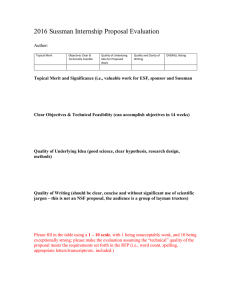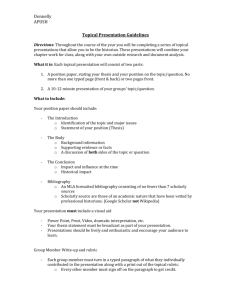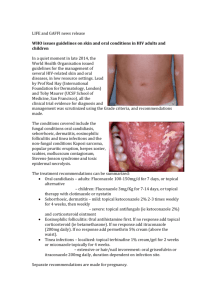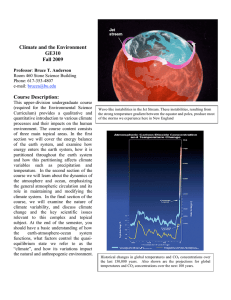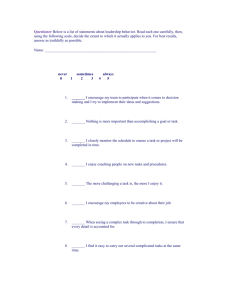Proceedings of 34th International Business Research Conference
advertisement
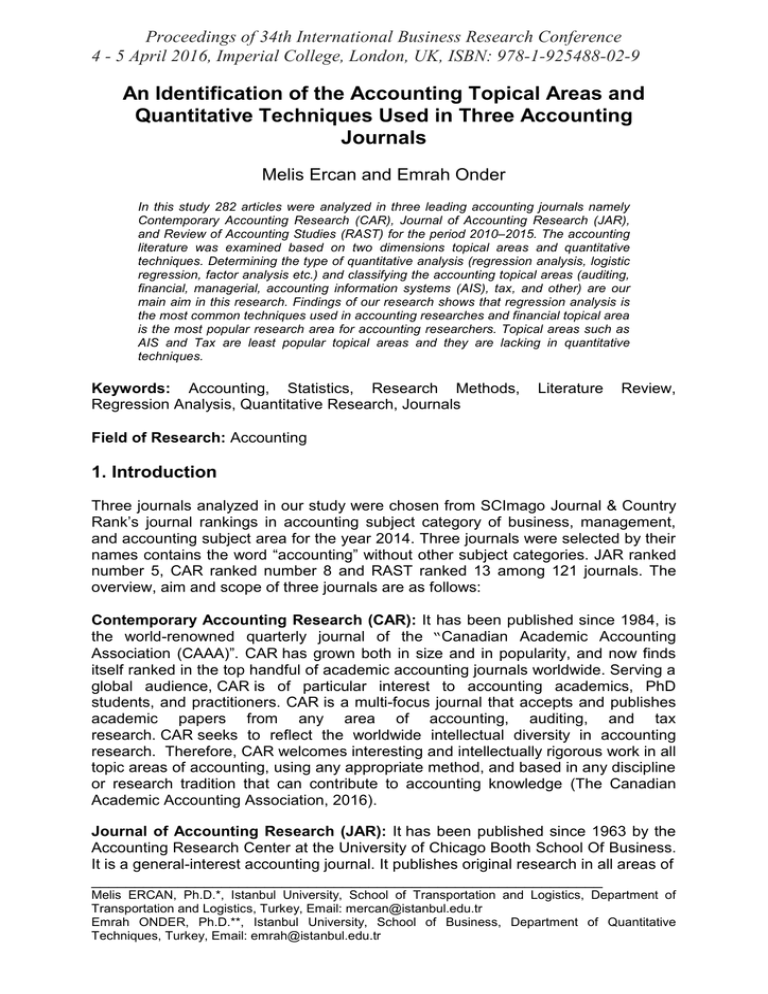
Proceedings of 34th International Business Research Conference 4 - 5 April 2016, Imperial College, London, UK, ISBN: 978-1-925488-02-9 An Identification of the Accounting Topical Areas and Quantitative Techniques Used in Three Accounting Journals Melis Ercan and Emrah Onder In this study 282 articles were analyzed in three leading accounting journals namely Contemporary Accounting Research (CAR), Journal of Accounting Research (JAR), and Review of Accounting Studies (RAST) for the period 2010–2015. The accounting literature was examined based on two dimensions topical areas and quantitative techniques. Determining the type of quantitative analysis (regression analysis, logistic regression, factor analysis etc.) and classifying the accounting topical areas (auditing, financial, managerial, accounting information systems (AIS), tax, and other) are our main aim in this research. Findings of our research shows that regression analysis is the most common techniques used in accounting researches and financial topical area is the most popular research area for accounting researchers. Topical areas such as AIS and Tax are least popular topical areas and they are lacking in quantitative techniques. Keywords: Accounting, Statistics, Research Methods, Regression Analysis, Quantitative Research, Journals Literature Review, Field of Research: Accounting 1. Introduction Three journals analyzed in our study were chosen from SCImago Journal & Country Rank’s journal rankings in accounting subject category of business, management, and accounting subject area for the year 2014. Three journals were selected by their names contains the word “accounting” without other subject categories. JAR ranked number 5, CAR ranked number 8 and RAST ranked 13 among 121 journals. The overview, aim and scope of three journals are as follows: Contemporary Accounting Research (CAR): It has been published since 1984, is the world-renowned quarterly journal of the “Canadian Academic Accounting Association (CAAA)”. CAR has grown both in size and in popularity, and now finds itself ranked in the top handful of academic accounting journals worldwide. Serving a global audience, CAR is of particular interest to accounting academics, PhD students, and practitioners. CAR is a multi-focus journal that accepts and publishes academic papers from any area of accounting, auditing, and tax research. CAR seeks to reflect the worldwide intellectual diversity in accounting research. Therefore, CAR welcomes interesting and intellectually rigorous work in all topic areas of accounting, using any appropriate method, and based in any discipline or research tradition that can contribute to accounting knowledge (The Canadian Academic Accounting Association, 2016). Journal of Accounting Research (JAR): It has been published since 1963 by the Accounting Research Center at the University of Chicago Booth School Of Business. It is a general-interest accounting journal. It publishes original research in all areas of ___________________________________________________________ Melis ERCAN, Ph.D.*, Istanbul University, School of Transportation and Logistics, Department of Transportation and Logistics, Turkey, Email: mercan@istanbul.edu.tr Emrah ONDER, Ph.D.**, Istanbul University, School of Business, Department of Quantitative Techniques, Turkey, Email: emrah@istanbul.edu.tr Proceedings of 34th International Business Research Conference 4 - 5 April 2016, Imperial College, London, UK, ISBN: 978-1-925488-02-9 accounting that utilizes tools from basic disciplines such as economics, statistics, psychology, and sociology. This research typically uses analytical, empirical archival, experimental, and field study methods and addresses economic questions in accounting, auditing, taxation, and related fields such as corporate finance, investments, capital markets, law, and information economics. The journal publishes four regular issues and one conference issue each year. The conference issue contains papers from the annual accounting research conference held at the University of Chicago (Onlinelibrary.wiley.com, 2016). Review of Accounting Studies (RAST): It has been published since 1996. The Review of Accounting Studies is owned and published four times a year by Springer. It provides an outlet for significant academic research in accounting including theoretical, empirical, and experimental work. The journal is committed to the principle that distinctive scholarship is rigorous. While the editors encourage all forms of research, it must contribute to the discipline of accounting (Wharton University of Pennsylvania Accounting Department Research, 2016). Topical areas were classified same with Coyne et al. (2010) described in their study. They used the following definitions to classify each article by topical area. The definitions are as follows: AIS: studies which address issues related to the systems and the users of systems that collect, store, and generate accounting information. Users are defined broadly to include those involved in collection, storage, or use of accounting information, or even the implementation of the system. These systems may be electronic or not. Research streams include, but are not limited to, design science, ontological investigations, expert systems, decision aides, support systems, processing assurance, security, controls, system usability, and system performance. Auditing: studies in which the topical content involves an audit topic. These studies vary widely and include, but are not limited to, the study of the audit environment external and internal, auditor decision-making, auditor independence, the effects of auditing on the financial reporting process, and auditor fees. Financial: studies that address the topical content of financial accounting, financial markets, and decision-making based on financial accounting information. Managerial: studies that examine issues regarding budgeting, compensation, decision making within an enterprise, incentives, and the allocation of resources within an enterprise. Tax: studies that examine issues related to taxpayer decision-making, tax allocations, tax computations, structuring of accounting transactions to meet tax goals, tax incentives, or market reactions to tax disclosures. Other: studies that do not fit into one of the other topical areas. The topical areas in these studies vary significantly and include such things as education, methodologies, The purpose of this study was to categorize and analyze the articles in three accounting journals by their topical areas and quantitative techniques used. Proceedings of 34th International Business Research Conference 4 - 5 April 2016, Imperial College, London, UK, ISBN: 978-1-925488-02-9 This study was organized as follows: In section 2, the literature review of subjects covered in this study was provided. In section 3, the methodology was given. In section 4 and 5, the findings/discussions, and summary/conclusions were given. 2. Literature Review Martin, Davis and Krapels 2012 compared the top six journals selected in an earlier survey of Association for Business Communication members as the top journals in which to publish for professional advancement. They used the variables found in other disciplines’ journal assessment articles, comparisons were made with the following: length of articles published, disciplines of authors, statistical methodology included, major discipline of article focus, number of references included, and research methods used with sample size where appropriate. The analysis involved each article in the six journals over 11 years of publication (1996-2007). 2,078 articles were analyzed. They found out top 10 statistical methods that were used in the journals as descriptive, correlation, modelling/theory, regression (all regression types in one category), factor analysis, chi-square, content analysis, discrete time logic analysis, interactions/post hoc tests, and standard deviation. Crawford-Welch and McCleary 1992 analyzed 653 articles in five leading hospitalityrelated journals for the period 1983–1989. Objectives of the study were to determine (a) the nature of hospitality writing and research to date (qualitative or quantitative), (b) the focus of hospitality publications to date (marketing, finance, administration, human resources, operations, research and development, economics) and (c) the type of statistical analysis used in hospitality research to date, i.e. the use of descriptive or inferential multivariate statistics. In the 653 articles analyzed, there were 293 uses of statistics other than frequencies. Many articles used more than one statistical technique. They found that the field of hospitality administration is lacking in rigorous and sophisticated quantitative research. T-test (Z-test), regression analysis, and chi-square were the most common statistical techniques used in the articles analyzed. They also found that the functional area of marketing had the highest percentage of using statistical techniques. Oler, Oler, and Skousen 2010, Dunbar and Weber 2014 analyzed the journals by using citations. They ranked the journals by topical areas (audit, financial, tax, etc.) and research methodology (archival, experimental, theoretical, etc.). Oler, Oler, and Skousen 2010 stated that financial accounting was becoming increasingly dominant except for two journals (Contemporary Accounting Research (CAR) and Accounting Organizations, and Society (AOS)) and other topics were declining. Chan et al. 2009 ranked accounting journals using dissertation citation analysis. They used citations from accounting dissertations completed during 1999–2003. They also ranked the accounting journals based on topical areas and research methods. The 247 dissertations generated 6386 successfully matched accounting journal citations. As a result they found that financial accounting accounted for the largest number of dissertations (136 of 247), followed by managerial accounting, a distant second with 37 dissertations. Dykxhoorn and Sinning 2010 summarized the Journal of International Accounting, Auditing and Taxation (JIAAT) between 2002-2010 by 82 articles and six special studies and analyze the types of topics and methodologies the authors used to enhance their understanding of the international accounting issues facing the accountancy profession. They found that financial accounting and reporting Proceedings of 34th International Business Research Conference 4 - 5 April 2016, Imperial College, London, UK, ISBN: 978-1-925488-02-9 comprised the majority of publications, research in the areas of taxation and auditing made up a sizable percentage of the publications during the 2002–2010 period. Pickerd et al. 2011 ranked individual accounting researchers based on their research productivity in the most recent six, 12, and 20 years. They extended prior individual faculty rankings by providing separate individual faculty research rankings for each topical area commonly published in accounting journals (accounting information systems (AIS), audit, financial, managerial, and tax) and for each research methodology commonly used by accounting researchers (analytical, archival, and experimental) for the years 1999 to 2009. They found that some professors publish widely in a variety of topical areas. Their results showed that it is relatively common to publish papers in multiple topical areas. Coyne et al. 2010 ranked accounting research programs constructed from publication counts in top eleven journals. They categorized each article written by topical area (auditing, financial, managerial, accounting information systems, tax, and other) and by methodology (analytical, archival, experimental, and other) and provided separate accounting program rankings by topical area and by methodology. Their results indicated that big three accounting journals as The Accounting Review (TAR), Journal of Accounting Research (JAR), and Journal of Accounting & Economics (JAE), The Accounting Review (TAR) publishes the broadest topical scope of articles. Accounting, Organizations and Society (AOS) and Behavioral Research in Accounting (BRIA) are the only nonspecialty-topic journals that publish a higher percentage of articles in an area other than financial (AOS publishes more managerial than any other topical area and BRIA publishes more “other” research and auditing than any other topical area). And also, the almost complete lack of publication of AIS research in any journal other than Journal of Accounting Information Systems (JIS). 3. The Methodology We began the data collection by accessing three journals chosen from SCImago Journal & Country Rank’s journal rankings during the period 2010-2015. The total number of articles reviewed across three journals was 282. We randomly chose 113 articles from CAR (total 288 articles), 92 articles from JAR (total 187 articles) and 77 articles from RAST (total 239 articles). The accounting topical area classification coding was performed by accounting expert and quantitative analysis classification coding was performed by quantitative techniques expert. The data was compiled in Ms Excel file with the column labels “Journal ID”, “Article ID”, “Year”, “Auditing”, “Financial”, “Managerial”, “AIS”, “Tax”, “Other” and “Analysis”. Ms Excel’s macro record and advanced filter facilities were used for evaluation process. 4. The Findings/Discussions The first analysis was on the topical areas of the research for determining which accounting topical areas had been researched the most extensively. Proceedings of 34th International Business Research Conference 4 - 5 April 2016, Imperial College, London, UK, ISBN: 978-1-925488-02-9 Table 1: Number of Articles by Topical Area Published in Different Journals Journal Name Auditing Financial Managerial AIS Tax Other Total Contemporary Accounting Research (113) 26 60 18 3 7 25 139 Journal of Accounting Research (92) 10 55 18 1 5 5 94 Review of Accounting Studies (77) 12 60 17 0 5 4 98 48 175 53 4 17 34 331 Total Table 1 shows that in all three accounting journals the topical area which received the highest level of attention by writers was “Financial” topical area. Some articles involves more than one topical areas. Therefore the sum of topical areas is more than total articles examined. “Financial” was the dominant topical area in journals and 62% of the articles were concerned with “Financial” topical area. Figure 1. Number of Articles by Topical Area Published in Different Journals “Managerial” and “Auditing” areas to which the articles related were second and third popular areas respectively. But their popularity is relatively close to each other. Figure 1 shows that in all three accounting journals the topical area which received the lowest level of attention by writers was “AIS” topical area. Table 2: Topical Areas of Articles by Quantitative Techniques Auditing Financia l ANOVA, ANCOVA, MANOVA 2 8 4 2 2 3 21 CORRELATION ANALYSIS 0 1 1 0 0 0 2 COST-BENEFIT ANALYSIS 1 2 0 0 0 0 3 COX REGRESSION 0 1 0 1 0 1 3 DESCRIPTIVE STATISTICS 0 1 0 0 0 0 1 FACTOR ANALYSIS 1 0 1 0 0 1 3 LOGISTIC REGRESSION 12 23 8 0 4 2 49 MATHEMATICAL MODEL 2 14 5 1 2 6 30 PANEL DATA ANALYSIS 0 4 1 0 0 1 6 PROBIT REGRESSION 4 11 3 0 2 2 22 REGRESSION 26 103 26 0 6 18 179 Analysis Manageria AIS Tax Other TOTAL l Proceedings of 34th International Business Research Conference 4 - 5 April 2016, Imperial College, London, UK, ISBN: 978-1-925488-02-9 STRUCTURAL EQUATION MODEL 0 1 0 0 0 0 1 T TEST 0 1 1 0 0 0 2 TIME SERIES ANALYSIS 0 3 1 0 0 0 4 TOBIT REGRESSION 0 1 2 0 0 0 3 TOTAL 48 174 53 4 16 34 329 Second investigation was the quantitative techniques of the articles published. Table 2 and Figure 2 show the number of topical areas of the articles by quantitative techniques used. In the 329 topical areas analyzed there were 179 use regression analysis. Figure 2: Topical Areas of Articles by Quantitative Techniques 5. Summary and Conclusions In this paper, we analyzed the articles in three accounting journals (CAR, JAR, and RAST) according to their topical areas and quantitative techniques used. Topical areas such as AIS and Tax are lacking in quantitative techniques. Considerably more attention needs to be focused in AIS and Tax topical areas. Regression analysis and type of regression analysis namely cox, probit, logistic, tobit etc. are most common techniques used in accounting researches. Financial topical area may be popular because of data availability and accessibility. More quantitative data can be accessed relatively easier by researchers in financial topical area. Accounting researchers may use different quantitative analysis other than regression analysis for evaluating interesting conclusions. We believe that future researches in accounting should incorporate the use of some popular quantitative techniques such as panel data analysis and structural equation model for inferring more complex patterns. Proceedings of 34th International Business Research Conference 4 - 5 April 2016, Imperial College, London, UK, ISBN: 978-1-925488-02-9 References Chan, K., Chan, K., Seow, G. and Tam, K. 2009. Ranking Accounting Journals Using Dissertation Citation Analysis: A Research Note. Accounting, Organizations and Society, 34(6-7), pp.875-885. Coyne, J., Summers, S., Williams, B. and Wood, D. 2010. Accounting Program Research Rankings by Topical Area and Methodology. Issues in Accounting Education, 25(4), pp.631-654. Crawford-Welch, S. and McCleary, K. 1992. An Identification of the Subject Areas and Research Techniques Used in Five Hospitality-Related Journals. International Journal of Hospitality Management, 11(2), pp.155-167. Dunbar, A. and Weber, D. 2014. What Influences Accounting Research? A Citations-Based Analysis. Issues in Accounting Education, 29(1), pp.1-60. Dykxhoorn, H. and Sinning, K. 2010. A Review and Analysis of International Accounting Research in JIAAT: 2002–2010. Journal of International Accounting, Auditing and Taxation, 19(2), pp.137-153. Martin, J., Davis, B. and Krapels, R. 2012. A Comparison of the Top Six Journals Selected as Top Journals for Publication by Business Communication Educators. Journal of Business Communication, 49(1), pp.3-20. Oler, D., Oler, M. and Skousen, C. 2010. Characterizing Accounting Research. Accounting Horizons, 24(4), pp.635-670. Onlinelibrary.wiley.com. 2016. Journal of Accounting Research - Overview Wiley Online Library. [online] Available at: http://onlinelibrary.wiley.com/journal/10.1111/(ISSN)1475679X/homepage/ProductInformation.html [Accessed 20 Mar. 2016]. Pickerd, J., Stephens, N., Summers, S. and Wood, D. 2011. Individual Accounting Faculty Research Rankings by Topical Area and Methodology. Issues in Accounting Education, 26(3), pp.471-505. The Canadian Academic Accounting Association. 2016. Contemporary Accounting Research (CAR). [online] Available at: https://www.caaa.ca/journals-andresearch/contemporary-accounting-research-car [Accessed 20 Mar. 2016]. Wharton University of Pennsylvania Accounting Department Research. 2016. Review of Accounting Studies. [online] Available at: https://accounting.wharton.upenn.edu/research/review-of-accounting-studies/ [Accessed 20 Mar. 2016].

